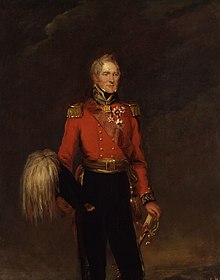Sir John Ormsby Vandeleur
| Sir John Ormsby Vandeleur | |
|---|---|

Sir John Ormsby Vandeleur
|
|
| Born | 1763 unknown |
| Died |
10 December 1849 (aged 86) Dublin, Ireland |
| Allegiance |
|
| Service/branch | Cavalry, Infantry |
| Years of service | 1781–1849 |
| Rank | General |
| Battles/wars |
|
| Awards |
Order of the Bath, 1815 Order of St. Vladimir, 2nd class Military Order of Max Joseph |
General Sir John Ormsby Vandeleur (1763 – 10 December 1849) was a British Army officer who fought in the French Revolutionary and Napoleonic wars.
Vandeleur, born in 1763, was the son of Richard Vandeleur (died 1772) and Elinor, daughter of John Firman of Firmount.
Vandeleur's received a commission as ensign in the 5th Foot in December 1781, and was promoted to be lieutenant in the 67th Foot in 1783. He served with his regiment in the West Indies, and, exchanging in 1788 into the 9th Foot, was promoted to captain on 9 March 1792. In October of the same year he again exchanged into the 8th Light Dragoons, and was promoted to major on 4 May 1793.
In April 1794 Vandeleur went with his regiment to Flanders to serve under the Frederick, Duke of York, where he took part in the principal actions of the Flanders Campaign, and accompanied the army in its retreat across Holland to Bremen. On the embarkation of the British army for England in April 1795 Vandeleur remained with a small corps under General Dundas until December.
In August 1796 he went to the Cape of Good Hope, and served in the operations against the Dutch under Generals Craig and Dundas. On 1 January 1798 he was promoted to be lieutenant-colonel in the 8th Light Dragoons.
In October 1802 Vandeleur went with his regiment to India, and served as lieutenant-colonel with local rank of colonel in command of a brigade of cavalry under Lord Lake in the Second Anglo-Maratha War 1803–1805. At the Battle of Laswari on 1 November 1803 Vandeleur turned the enemy's left flank and took two thousand prisoners, receiving the thanks of Lord Lake. He was similarly distinguished in November 1804 for the cavalry affair at Fathghar, where the Maratha chief Holkar was surprised and defeated. Equally brilliant were his charge and recapture of artillery at Afzalghar on 2 March 1805.
...
Wikipedia
